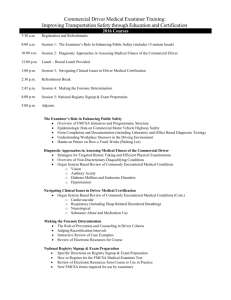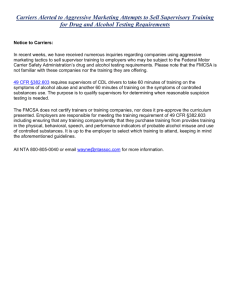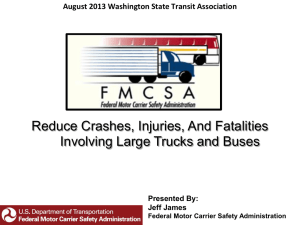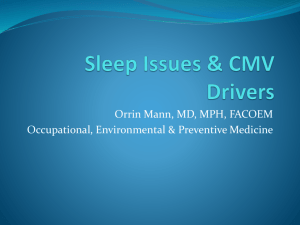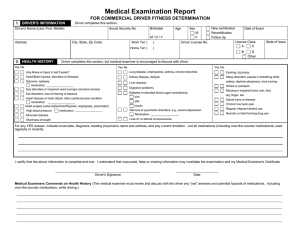dot_clearance_add
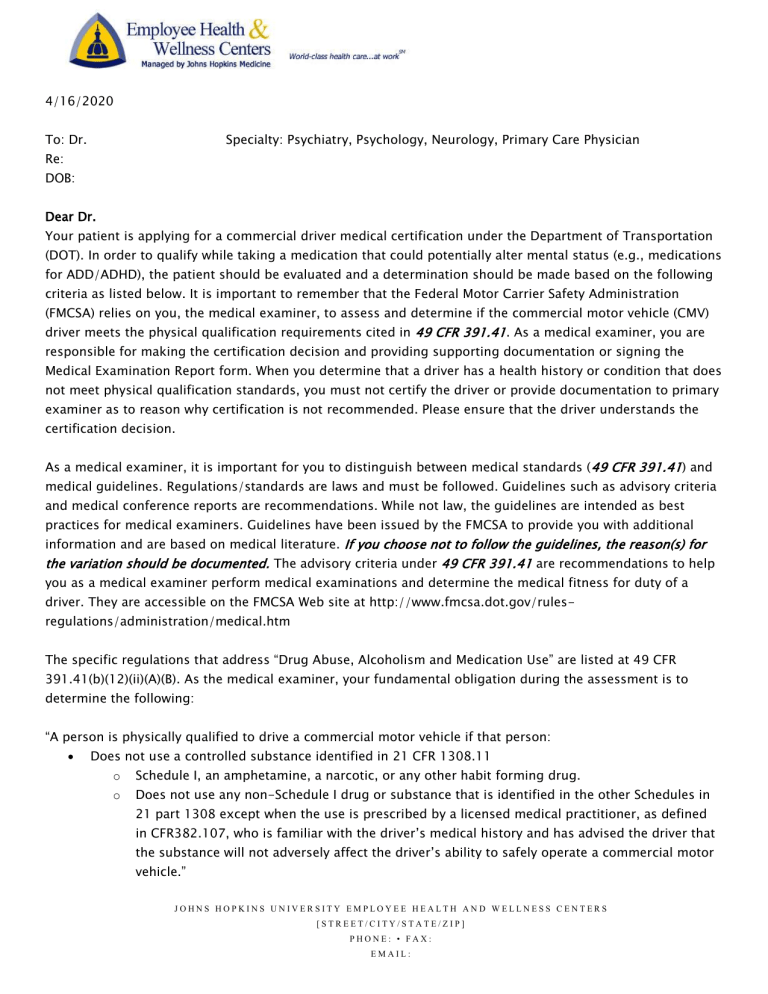
4/16/2020
To: Dr.
Re:
Specialty: Psychiatry, Psychology, Neurology, Primary Care Physician
DOB:
Dear Dr.
Your patient is applying for a commercial driver medical certification under the Department of Transportation
(DOT). In order to qualify while taking a medication that could potentially alter mental status (e.g., medications for ADD/ADHD), the patient should be evaluated and a determination should be made based on the following criteria as listed below. It is important to remember that the Federal Motor Carrier Safety Administration
(FMCSA) relies on you, the medical examiner, to assess and determine if the commercial motor vehicle (CMV) driver meets the physical qualification requirements cited in
49 CFR 391.41
. As a medical examiner, you are responsible for making the certification decision and providing supporting documentation or signing the
Medical Examination Report form. When you determine that a driver has a health history or condition that does not meet physical qualification standards, you must not certify the driver or provide documentation to primary examiner as to reason why certification is not recommended. Please ensure that the driver understands the certification decision.
As a medical examiner, it is important for you to distinguish between medical standards (
49 CFR 391.41
) and medical guidelines. Regulations/standards are laws and must be followed. Guidelines such as advisory criteria and medical conference reports are recommendations. While not law, the guidelines are intended as best practices for medical examiners. Guidelines have been issued by the FMCSA to provide you with additional information and are based on medical literature.
If you choose not to follow the guidelines, the reason(s) for the variation should be documented.
The advisory criteria under
49 CFR 391.41
are recommendations to help you as a medical examiner perform medical examinations and determine the medical fitness for duty of a driver. They are accessible on the FMCSA Web site at http://www.fmcsa.dot.gov/rulesregulations/administration/medical.htm
The specific regulations that address “Drug Abuse, Alcoholism and Medication Use” are listed at 49 CFR
391.41(b)(12)(ii)(A)(B). As the medical examiner, your fundamental obligation during the assessment is to determine the following:
“A person is physically qualified to drive a commercial motor vehicle if that person:
Does not use a controlled substance identified in 21 CFR 1308.11 o Schedule I, an amphetamine, a narcotic, or any other habit forming drug. o
Does not use any non-Schedule I drug or substance that is identified in the other Schedules in
21 part 1308 except when the use is prescribed by a licensed medical practitioner, as defined in CFR382.107, who is familiar with the driver’s medical history and has advised the driver that the substance will not adversely affect the driver’s ability to safely operate a commercial motor vehicle.”
J O H N S H O P K I N S U N I V E R S I T Y E M P L O Y E E H E A L T H A N D W E L L N E S S C E N T E R S
[ S T R E E T / C I T Y / S T A T E / Z I P ]
P H O N E : • F A X :
E M A I L :
Further guidance regarding “Drug Abuse, Alcoholism and Medication Use” can be found at the following website: http://www.fmcsa.dot.gov/safety-security/safety-initiatives/drugs/drug-guidelines.pdf
Attention Deficit Hyperactivity Disorder
According to Dr. Natalie Hartenbaum,
The DOT Medical Examination
(2010), the following direction is provided. “…the conference report recommended that examiners evaluating individuals with past medical history do the following: 1. Arrange a practical driving test conducted by an occupational therapist. 2. Make collateral contact with employers and others who have observed the examinee’s complete legal and driving records. 3. Review a detailed work history of the examinee, with particular attention to the length of service and the reason for and mode of termination for each employer.”
Further, “This topic has not been specifically addressed by a Medical Expert Panel or by the Medical Review
Board. However, the FMCSA recently advised in the Medical Examiner Handbook [5] that drivers with ADHD should not be certified until the diagnosis has been confirmed and treatment has been shown to be effective…The handbook advises that drivers should have a complete evaluation from an appropriate mental health professional who understands the functions and demands of commercial driving. Drivers with ADHD should be certified no less than annually…”
Please indicate your opinion below and provide your signature
__From my perspective as a physician treating this patient for ADD or ADHD, this patient ( IS / IS NOT ) physically capable of safely operating a commercial vehicle (tractor trailer/passenger bus) on interstate highways.ww
Signature: ________________________________________ Date:_______________
Name or Office Stamp: ______________________________ Phone:______________
Thank You,
[Provider Name, Credential]
J O H N S H O P K I N S U N I V E R S I T Y E M P L O Y E E H E A L T H A N D W E L L N E S S C E N T E R S
[ S T R E E T / C I T Y / S T A T E / Z I P ]
P H O N E : • F A X :
E M A I L :
